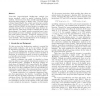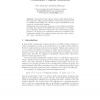10 search results - page 1 / 2 » Binding-time Analysis: Abstract Interpretation versus Type I... |
ICCL
1994
IEEE
13 years 9 months ago
1994
IEEE
LOPSTR
2004
Springer
13 years 10 months ago
2004
Springer
Offline partial evaluation techniques rely on an annotated version of the source program to control the specialisation process. These annotations guide the specialisation and have ...
PEPM
1994
ACM
13 years 9 months ago
1994
ACM
First-order projection-based binding-time analysis has proven genuinely useful in partial evaluation Lau91a, Lau91c]. There have been three notable generalisations of projection-b...
FLOPS
2010
Springer
13 years 10 months ago
2010
Springer
Abstract. Binding-time polymorphism enables a highly flexible bindingtime analysis for offline partial evaluation. This work provides the tools to translate this flexibility into...
AMAST
1998
Springer
13 years 9 months ago
1998
Springer
Abstract. This paper proposes a tool to support reasoning about (partial) correctness of constraint logic programs. The tool infers a speci cation that approximates the semantics o...


